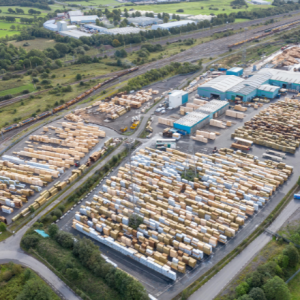An article for inCumbria Magazine on how BSW Timber weathered the storm of the coronavirus pandemic and adapted to new methods of communication.
Marketing has traditionally been a cost centre within companies, and when times get tough, it is often one of the first areas, along with training, to get cut. However, the pandemic has created a need for resilience that has put the customer journey and their voice first. So, the customer’s perspective is now more critical than ever, and marketing departments are centre stage, where they belong.
One Cumbrian business which knows all too well there is no going back to the ‘old normal’ is BSW Timber in Carlisle. Marketing Manager James Brennan is one of our Chartered Institute of Marketing (CIM) graduates, so we asked him what has changed for them and how he has found marketing through the pandemic.
“It’s hard to know where to start when trying to unfold the events of the past year or so. When Covid, working from home and Zoom calls first started I think there was a sense of just trying to survive through ‘unprecedented times’, however big or small your business was.
“Our customer base – builders’ merchants such as Jewson and Travis Perkins – close their doors almost overnight, so we had to adjust our operations accordingly. This meant a reduced workforce at our sawmills, which were suddenly only supplying key sectors such as pallet and packaging, paper and pulp, and wood fuel markets. Suddenly, construction was given the green light to open up as a key sector, and suppliers have been trying to catch up with demand ever since.
“How we communicated with each other both internally and externally changed drastically as most of us had never even used Teams before. If anything, things swung too far the other way, with meetings taking up most of the week. However, for us, the virtual experience has brought us closer to the likes of customers, suppliers, and trade bodies within the industry, but it has made it increasingly difficult to communicate with colleagues inside the business, as people can unknowingly slip into their own silos. You don’t pick up on conversations as you do in an office environment. Hopefully, we are coming to the end of the Covid storm – with added Brexit and market challenges. The workplace dynamic has potentially shifted forever. I don’t think any outcome will mean abandoning traditional means of marketing, or at least not in the construction and manufacturing sector. If anything, I think we’ve all been forced into finding a blend of the marketing mix that’s more suited to the modern world.
“For us, this has included acknowledging that as well as needing to strengthen our digital marketing, we also need to bolster our offline offer for when a sense of normality returns.
“We’ve all been forced to be more adaptive to the external environment. Rather than struggling on and feeling sorry for yourself or flying high and patting yourself on the back, the situation we’ve found ourselves in has encouraged us to be more reflective; to take a step back and think about how to improve the customer experience, deliver value, and strengthen what is a volatile supply chain.
“There is no doubting that the construction sector, which is often traditional in its nature, is now more switched on to online, but it’s about being more proactive and prepared across the board.”
Whether the changes in consumer behaviour stick will have to be monitored carefully, therefore as marketers, we need to think differently and be flexible on how we reimagine our marketing.
“But what we have learnt is relationships – both internal and external –are everything.”

